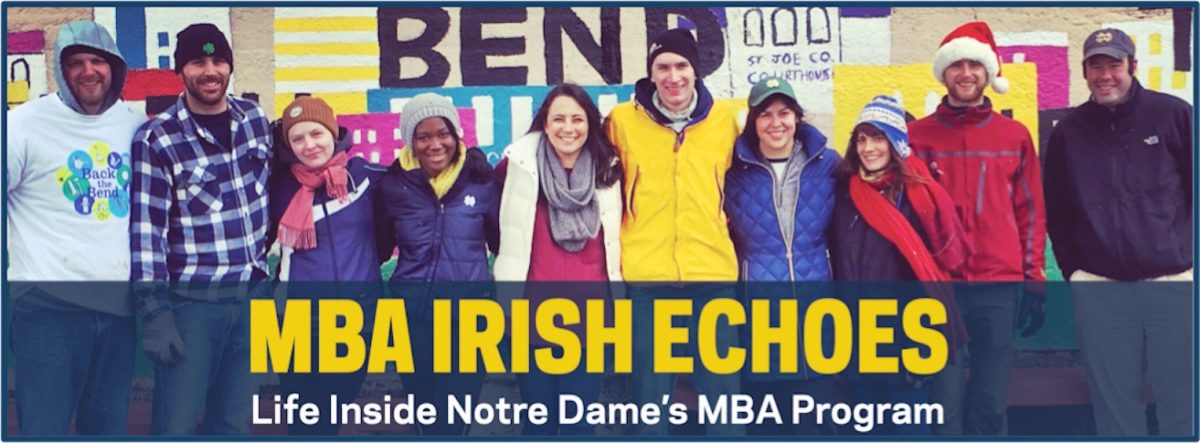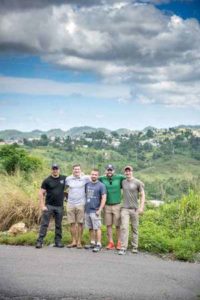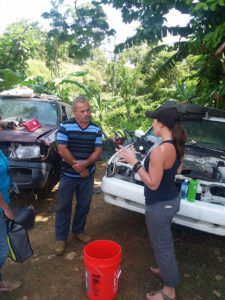More and more business headlines are talking about data. Big data, data mining, data uses, what data companies are collecting, how they are using it, what they are doing with it – it’s all about data. When looking for an MBA program, I knew I wanted something that would stand out and set me apart. Enter the MBA/MSBA dual degree program at Notre Dame’s Mendoza College of Business.
What is it and how is it different than an MBA with a concentration in Business Analytics?
Both programs are two years in length, and participants in both are considered to be part of the same cohort. The dual degree is 68 credit hours with 10 of those hours being in MSBA electives in addition to the required MSBA courses and 11 hours in general electives (where you have the ability to complete a concentration track). The MBA is 64 credit hours that include the completion of at least one concentration – which could be the Business Analytics track. Essentially, the MSBA requires that more of your courses be related to Business Analytics. Classes related to analytics include: Predictive Analytics, Machine Learning, Data Visualization, and Data Storytelling.
More requirements, more perks
As an MBA/MSBA student, I have all the same resources as the rest of my cohort – the career center, graduate business programs, and all the facilities. Moreover, I get priority registration. Because there are additional requirements for the MSBA, those in the dual degree program register for classes first – ensuring we get all the courses we need and giving us first pick of time slots. I picked my schedule and completed registration before the rest of my cohort had even started registering.
International Opportunities
As an MBA student, we have multiple opportunities to go abroad – either in an International Immersion or in the Mod Abroad program. The International Immersions are 10 day programs in China, Chile and Argentina, or South Africa while the Mod Abroad is in Santiago, Chile. International Immersions can be done the spring of your second year as an MBA/MSBA student, and the Mod Abroad takes place in the fall of your second year. Being an MBA/MSBA student does not exclude you from these opportunities, and the advisors in the Graduate Business Programs Office are there as a guide to ensure you can take advantage of these opportunities as well as completing your MBA/MSBA requirements.
STEM Designation
Speaking of international..The MBA/MSBA is a STEM designated degree program that is part of the traditional two-year MBA cohort. Successfully completing a STEM designated degree program may allow international students to remain in the United States for an extended period of time to help with the demand for STEM professionals.
To learn more about the dual degree MBA / MSBA program, visit Notre Dame’s Website.

 On September 20, 2017, Hurricane Maria smashed into Puerto Rico after rapidly strengthening into one of the strongest storms ever recorded. The small island territory which had already been struggling with decades of corruption and decaying infrastructure, didn’t stand a chance. Much of the island was destroyed, and although Puerto Rico had boasted a densely-packed population of 3.3 million people prior to the storm, nearly half a million would make their exodus in the months that would follow it.
On September 20, 2017, Hurricane Maria smashed into Puerto Rico after rapidly strengthening into one of the strongest storms ever recorded. The small island territory which had already been struggling with decades of corruption and decaying infrastructure, didn’t stand a chance. Much of the island was destroyed, and although Puerto Rico had boasted a densely-packed population of 3.3 million people prior to the storm, nearly half a million would make their exodus in the months that would follow it. The device they used was simple: a $50 Sawyer filter that can be bought online. However, because of the filter’s unique design (similar to that of a dialysis machine) it could supply enough clean drinking water to a hundred people for up to five years. This was our task—to assist Waves for Water in getting these filters into the hands of struggling Puerto Ricans who needed them, all while looking for opportunities to improve Waves for Water’s operations.
The device they used was simple: a $50 Sawyer filter that can be bought online. However, because of the filter’s unique design (similar to that of a dialysis machine) it could supply enough clean drinking water to a hundred people for up to five years. This was our task—to assist Waves for Water in getting these filters into the hands of struggling Puerto Ricans who needed them, all while looking for opportunities to improve Waves for Water’s operations.